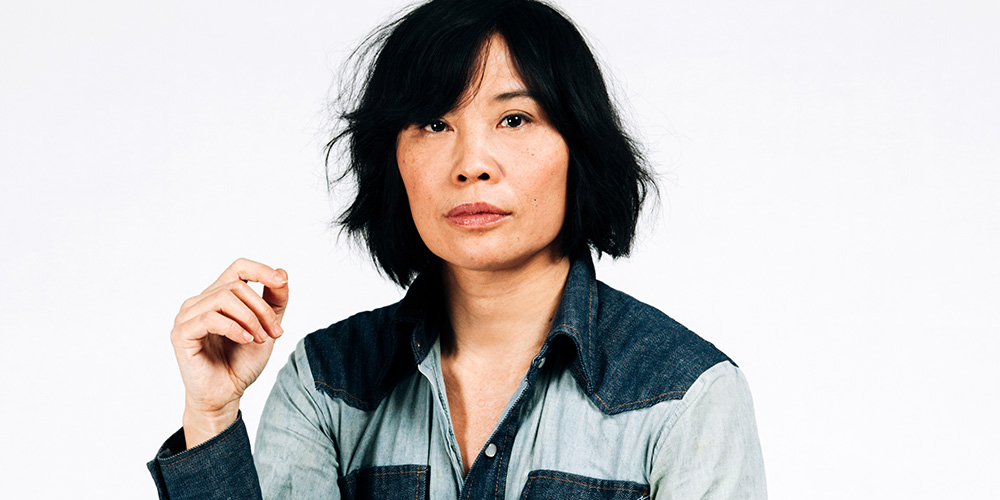Interview: Sook-Yin Lee talks Octavio is Dead
The second time writer and director talks about her new genre-defying film.
Sook-Yin Lee is a second time writer and director whose new film Octavio is Dead is out now in theatres. The film is a genre-defying film that sees a young woman, Tyler, explore herself through gender and sexuality whilst learning about her recently deceased, estranged father whom she encounters as a ghost. The film is fresh out of the Inside Out festival, the perfect festival for a film that is both openly queer and Canadian.
Sitting outside a coffee shop in liberty village, Sook-Yin Lee sips her coffee and starts the interview with a smile. What to ask her first is a no brainer.
You have mentioned in other interviews that you were inspired by an experience with a ghost and I noticed in the credits that there were real ghosts named. Could you tell us a bit about that?
We thank a couple of ghosts in the credits of Octavio is Dead. The first ghost is a Barcelona based Catalan poet who was dead when I first met him, which might sound odd. Some summers ago I was travelling alone in Europe and my friends sister’s father had passed away and they had been estranged, and she had recently inherited his apartment in Barcelona. She knew I was travelling to Barcelona so she offered me the key to his place. She hadn’t been there since he had passed away. So I went there in the heat of summer and found his place. It was a circuitous venture to find this very old building and it was sweltering hot. And when I walked inside there was a big sort of heavy hot stench of … just ancient stuffy feeling of dead guy.
His apartment was dimly lit. It was full of books. It was dusty and a lot of remnants of his living were there. Down to his toenails cut in little piles in the bathroom and to his socks rolled off his feet right beside his slippers.
And I immediately felt a presence and I knew that if I was a dead guy and a stranger walked into my place I would be like who are you? I felt a great deal of hostility towards me. I tried to explain that I was his daughter’s friend just staying for a few days. He seemed to accept it but there were a number of weird poltergeist things. In fact, many of the things that occur in the movie …right down to the flooding the bathroom and the neighbour from downstairs being angry and coming upstairs and screaming at me… that was all true. So it took a while for Juan Ferraté to be okay with me in his space. I could start feeling that he was not as hostile. After a while, he liked having me around. We kind of became the odd couple.
I knew at the time this would unfurl into a really neat story so I began to fictionalise it. I thought it would be more interesting to have, instead of a friend’s friend going to this place, a daughter who was estranged to her father, what might that look like? So I began to sort of fictionalise these real life events. I think because I have those sense memories of what occurred it seems like a confabulous, magical, or strange world, but it’s deeply entrenched and grounded in a real experience. So I’m bringing some of those qualities that I remember…colour, the quality of his apartment, and atmosphere to the movie.
It’s interesting you say that because one thing that stood out to me was the set design and the way that the apartment in the film looked really beautiful. Was that based a lot on the apartment from your experience?
In Ferraté’s apartment it was apparent that he was a real hip swinger a long time ago. His furniture was hip swinger stuff from a long time ago that had deteriorated and got stained and soiled over the years but nevertheless was cool, Mexican minimalist furniture. He had very good taste, but it was like being in a tomb of a man that never goes out. A man of books and thinking and an old man who was once young and vibrant and is now stuck in his place.
I have so many photographs and pictures from that time. At one point I wanted the movie to take place on the streets of Barcelona. Another adaptation happened in Mexico City. Finally I decided it would be more interesting to keep it within Canada and to set it in a fictionalised city within Canada. Octavio is a political refugee and he’s seeking asylum in another country as opposed to being able to return to his home country. In my documentary work I was coming across and meeting people that were not able to return to their home country so they are stuck in Canada. So there’s another layer of alienation that happens there. And plus I was getting much more support and funding here.
So there was something about the city of Hamilton that was so run down and I love that kind of decayed, industrial look. It’s a gorgeous city. So I set it in Hamilton.
I have many folders of looks and feelings and all sorts, even down to the accessories in his house, based upon my travels. I worked with Eliza Solesbury who is a production designer and so she took those things and reinterpreted them and was like “we won’t be able to get Mexican minimalist furniture here and if we did it would be very expensive.” So she sort of adapted it to find whatever that feeling was that was inside the photographs.
It was pretty neat too because I was knocking door to door trying to find a place in Hamilton and I came across one space. It was great. It was all one floor, a very old building, with wide hallways. The house was owned by an art historian, an elderly lady, and as I told her the story of the movie she said, “Well, my husband is haunting the front library and right now he is telling me to let you shoot in this house.” So she vacated the premises and let us have the run of her place! And it was a dream. She let us use her place for next to nothing.
So is that the other ghost in the credits?
Lee: Yes, yes it is.
Did you feel that having a supernatural element to the film would set up certain expectations? And how do you feel they would play into the viewing of the film?
Lee: Yeah. I do notice that as an artist that my music and genre defying movies do not fit easily into a particular category. My experience of life is that it’s funny and horrifying and scary and wonderful. And so those elements are in my movies. I could never just do a kitchen sink drama or a primary body count horror movie.
Just having lived through that experience in Barcelona I knew how spooky that felt. I wanted to convey with that mystery and atmosphere and I think that the language of supernatural and horror films are so cinematic. There are so many aspects of those types of movies where you don’t have to chock-a-block it full of dialogue. It’s what you see on the screen that conveys a lot.
I’m a big scaredy-cat and I understand those things that make me scared and uneasy and I wanted to lean into those. Previously, I had done a lot of dramatic comedies that were brightly lit or realistically lit. But with this one I wanted to play with dark and light and really create a moody look. But it doesn’t really pay off if you’re a genre person… there’s no gore. There’s no one who dies in a bloody mess. I think some horror fans would like to see that.
There are some classic ghost stories that are more psychological than torturous and bloody and it has something in common with those. But I’m really looking at elements of horror and those cinematic films that speak to an unease in your own self and in your person. That was what I was attracted to: to play with those tonalities and to apply it to the experience of Tyler being a young person trying to figure out who they are.
What advice would you give to a young or a first time film maker?
I think there’s something about honouring your own curiosities and your own special idiosyncratic waves. People feel like they’ve got to kerb or write something that’s been a proven success. When you’re young and you’re starting out, I would say find your voice and be true to that voice.
It is so neat to see film makers’ first films because you see the template there. Every great filmmaker; watch their first movie. It’s usually pretty lumpy and it’s not a perfect thing, but you see the essence of what’s being told that is transcendent to all of their movies. They might learn skill and so forth but there is something so boundlessly playful and brilliant in so many of those first movies, even though they might not be ‘pro’. It’s the most important thing that is inside there and then they’re able to then develop and make smoother. But that urgency of soul and expression is the thing.



